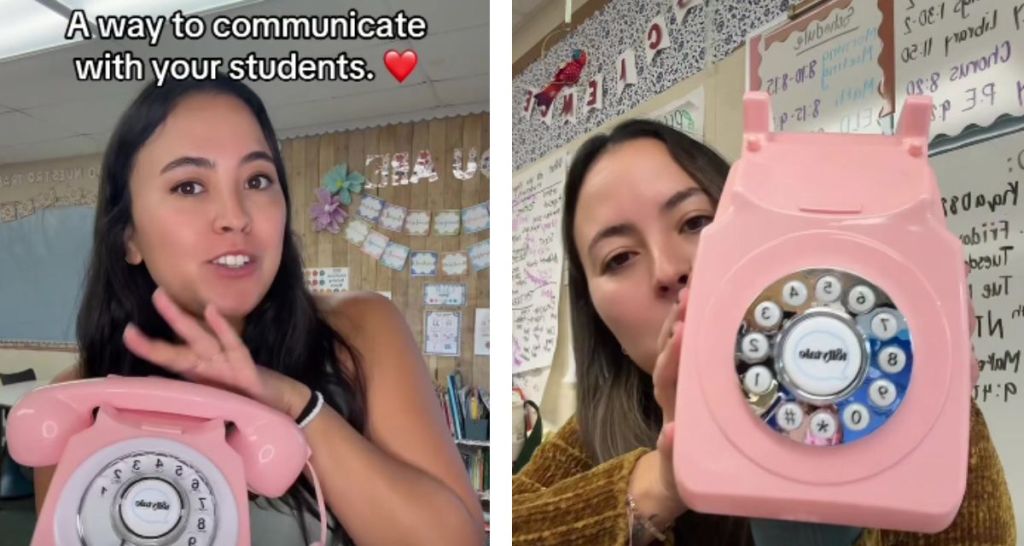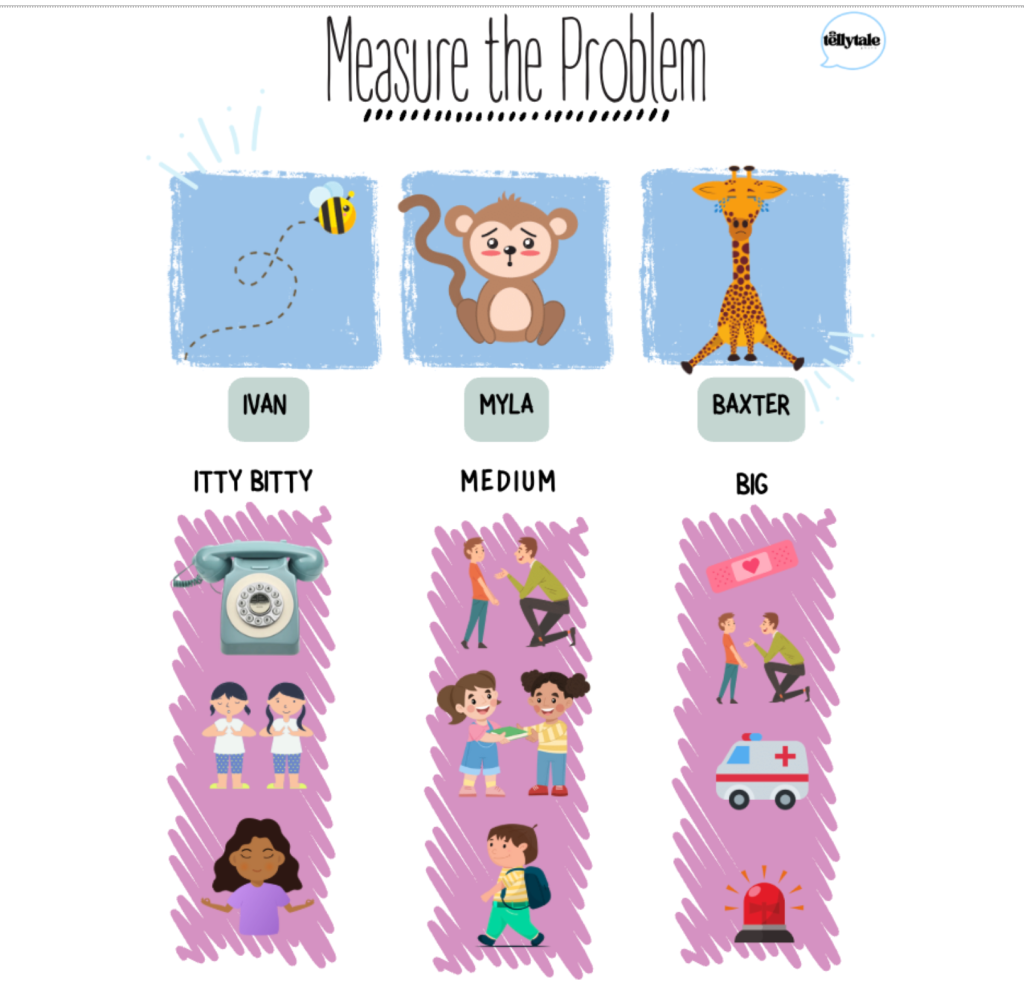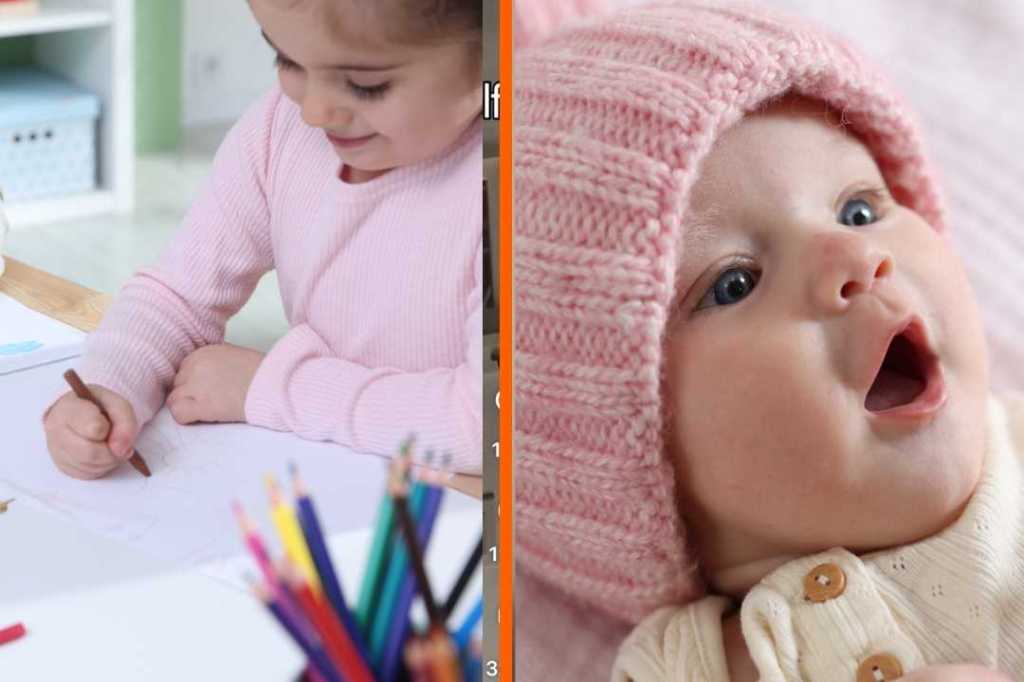It used to be that if you said the word “homeschooler,” people would conjure up images of a Bible-carrying homesteader whose parents kept them out of school so they wouldn’t learn about “dangerous” ideas like carbon dating and evolution.
While those kinds of homeschoolers still exist, the homeschooling world has become much larger and more diverse in recent decades. In 1999, there were approximately 850,000 students homeschooled in the United States. Before the COVID-19 pandemic, that number had tripled to an estimated 2.5 million, and in the past year, it’s grown by over a million more to 3.62 million. These days, you’ll meet homeschool parents from all walks of life who have chosen to educate their own kids for all kinds of reasons, moving the “typical homeschooler” stereotype further and further from reality.
Now we have a new generation of Americans thinking about how they want their kids to be educated. Gen Z is now 12 to 26 years old, with the 20-somethings at a prime age for starting (or at least imagining) their future family lives. Interestingly enough, they are even more keen on homeschooling their kids than their parents or grandparents were.
Education technology company Age of Learning conducted an analysis of Google search trends and commissioned an online survey of 1,064 parents and aspiring parents to explore American interest in homeschooling. The results are telling, if somewhat surprising in some ways.
First, it’s clear that Gen Z has pretty positive feelings about homeschooling, since nearly half of them are considering homeschooling their own kids—74% more than other generations of parents.
Of course, it’s always easier to imagine homeschooling kids you don’t have yet, so their age and stage of life probably accounts for a portion of that interest. But it says something that 59% of aspiring parents are more interested in homeschooling than public or private schools.
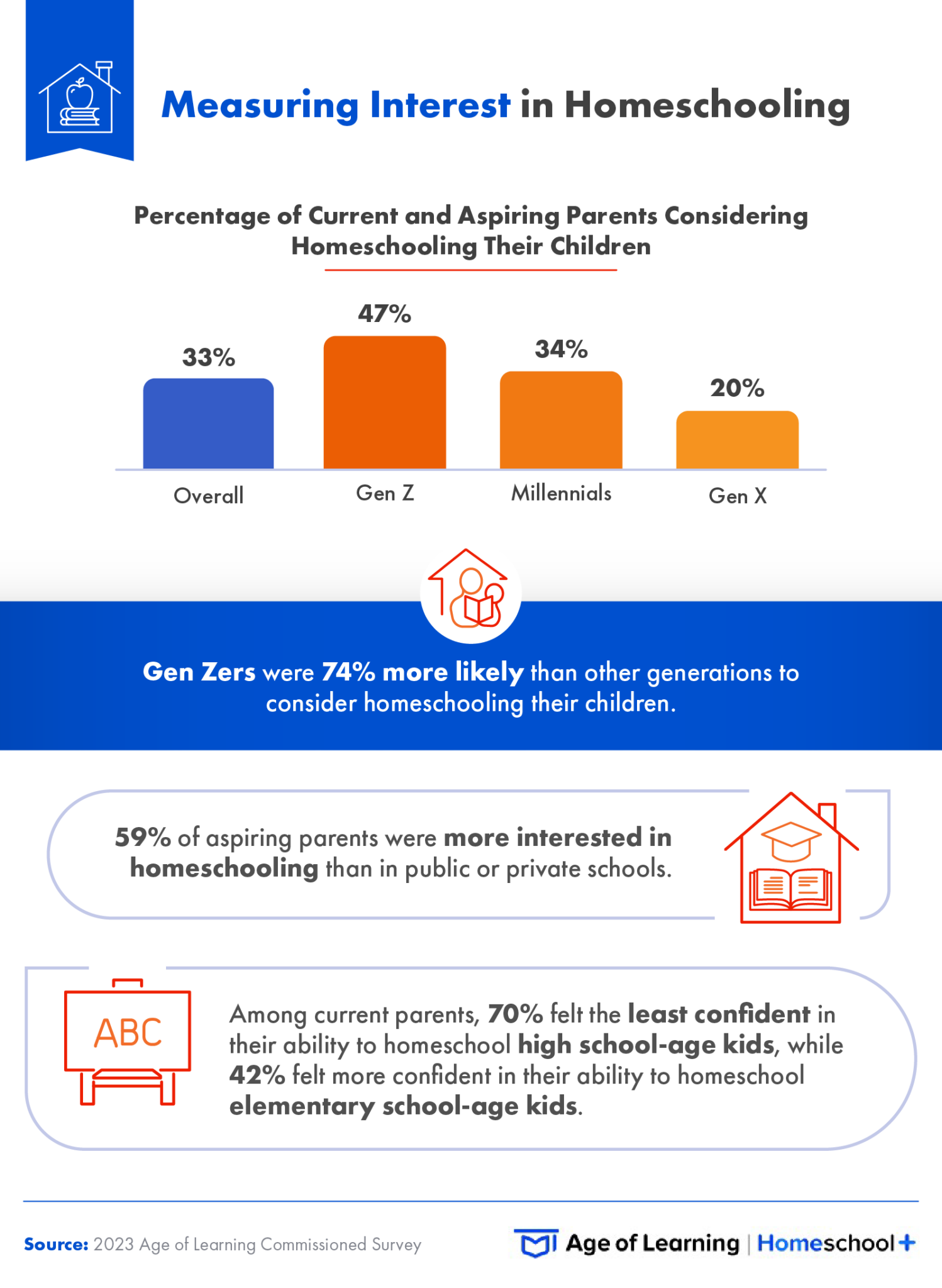
So why are so many parents and aspiring parents turning to homeschool as an educational option? It seems logical that the vast educational resources that the internet has spawned makes homeschooling seem far more doable than it used to be. However, the motivation for wanting to homeschool is primarily about safety and freedom.
Current parents cited “providing a safer environment” as the most common motivation for homeschooling at 66%, followed by “flexible schedule” at 56%, “preventing toxic socialization” at 55% and “providing individualized instruction” at 42%. “Providing a safer environment” topped Gen Z’s list of motivators as well at 68%, which does make one wonder whether the active shooter drills they grew up play a role in how they feel.
And those the religious beliefs that pushed people to homeschool way back when? Those came in at the bottom of the list with only 16% of people citing “religious or philosophical beliefs” as motivation to homeschool.
Motivations varied by region, however, and the breakdown of which regions cited which reasons the most often is a bit surprising.
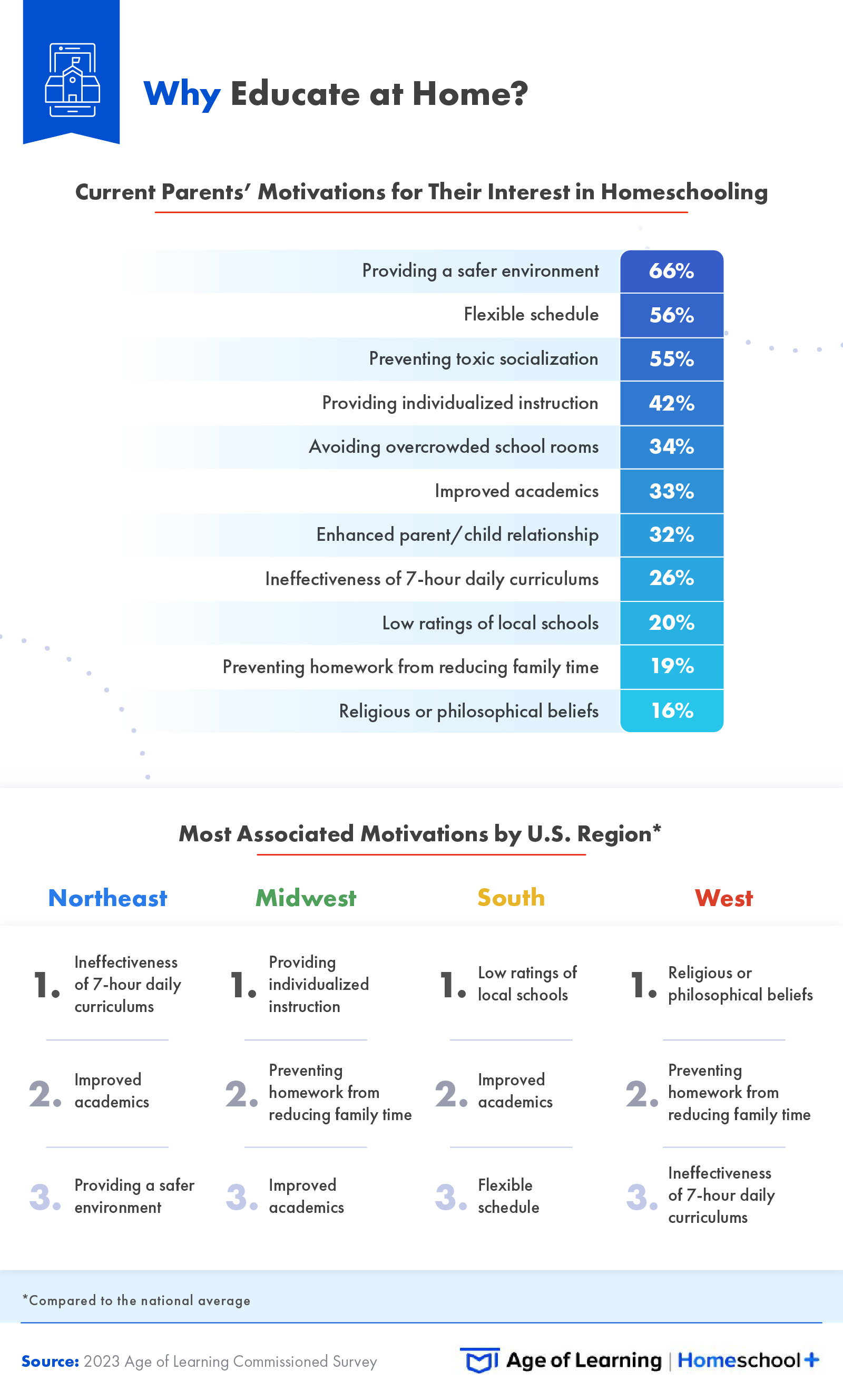
If someone were to ask which region cited religion as their main motivator for homeschooling, what would you guess? Personally, I would have thought the South, or maybe the Midwest. Nope. The West cited “religious or philosophical beliefs” the most often. In the South, it’s the “low ratings of local schools,” while the Northeast is looking at the “ineffectiveness of 7-hour daily curriculums” and the Midwest cited “providing individualized instruction” as the main motivation Huh. Who knew?
Surely, these survey respondents must have cited some downsides of homeschooling, though, right? Well, yes. Numbers-wise, however, the challenges don’t outweigh the benefits current and aspiring parents see. As one might expect, “limited socialization opportunities” topped the list of challenges that concern parents, but as most homeschoolers will tell you, the socialization “issue” is far less of an issue than people make it out to be (so long as you aren’t holing up in a cave somewhere and not having your kid involved in any activities).
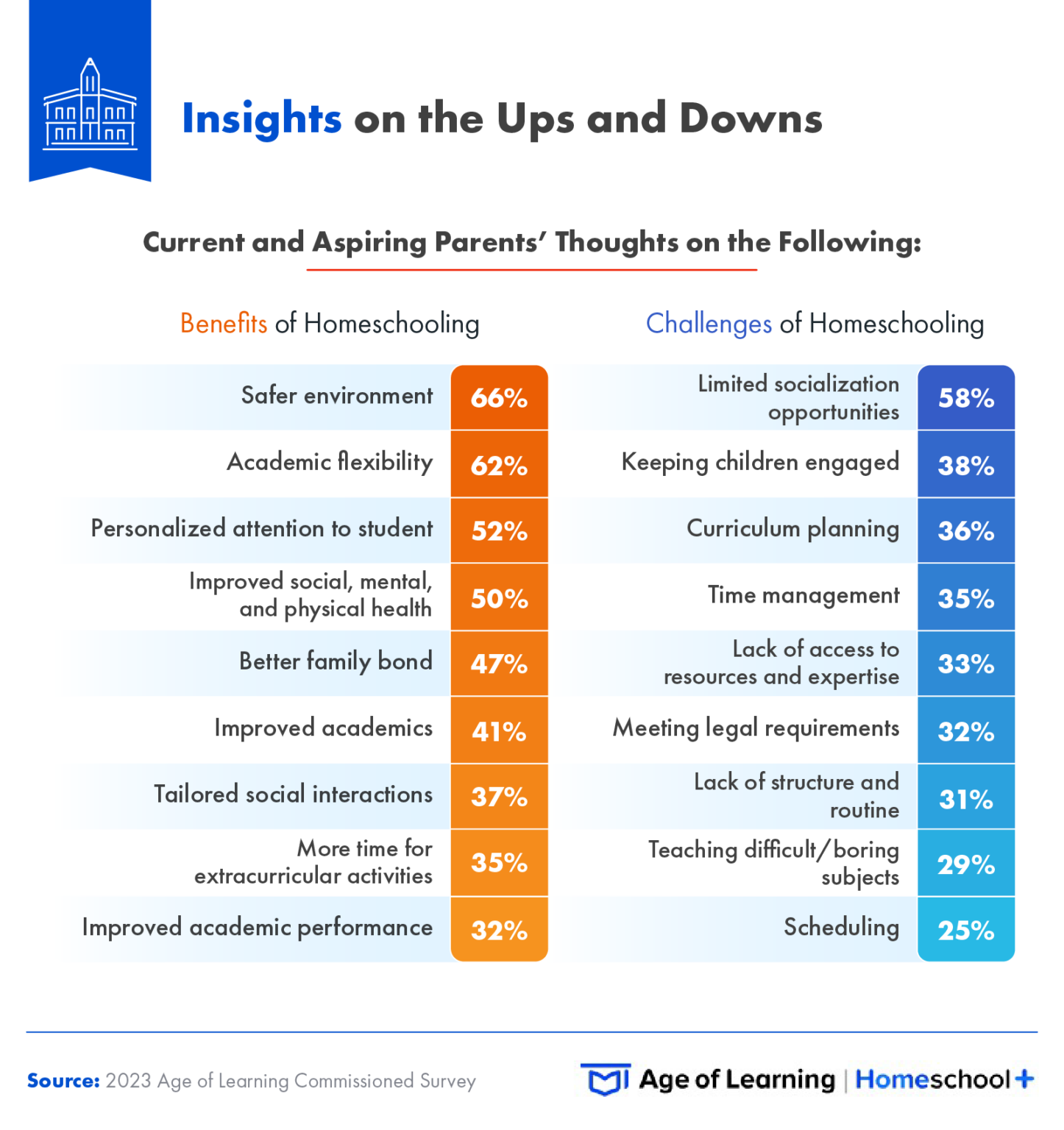
<a href="https://www.homeschoolplus.com/learn/wp-content/uploads/2023/04/insights-on-the-ups-and-downs-1446×1536.png">www.homeschoolplus.com</a>
Going back to our Gen Z friends, another thing to note is their feelings about government involvement in homeschooling. Freedom from excessive standardized testing and flexibility in learning have long been touted benefits of homeschooling, so it’s fascinating to see that Gen Z actually favors government involvement in homeschooling more than any other generation. At 77%, they are more likely than any other generation to believe homeschooled students should be required to participate in state testing, and 91% believe the government should mandate homeschooling subjects.
As it stands now, each state has different laws and requirements for homeschooling, and they can vary greatly. New Jersey has the least number of regulations for homeschoolers, while Pennsylvania has the most. Some states simply require you to notify your school district that you are homeschooling and that’s it. Some states require you to be under the supervision of a certified teacher and provide portfolios of your child’s schoolwork for evaluation. Some states require testing, some don’t.
Having been a public school teacher and also having been a homeschooling parent for two decades, I’ve experienced how valuable freedom to learn in whatever way suits individual kids best can be. It will be interesting to see if Gen Z’s desire for government requirements shifts as they actually delve into the reality of educating their own kids.
One thing seems certain: Homeschooling is growing and showing no signs of slowing down any time soon, and if Gen Z keeps their current interest level, we may see an exponential explosion in homeschooling numbers in the next decade or two.





